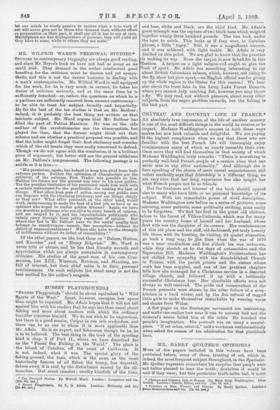CHÂTEAU AND COUNTRY LIFE IN FRANCE:* AN absolutely true impression
of the life of another country is one of the most difficult things in the world to receive or to impart. Madame Waddington's success in both these ways makes her new book valuable and delightful. We are paying it the highest compliment when we say that those who are :familiar with the best French life will thoroughly enjoy reminiscences many of which so nearly resemble their own. Once more they will find themselves in that society of which Madame Waddington truly rernarks "There is something in perfectly well-bred French people of a certain class that one never sees in any other nationality." And although she is here speaking of the charm of mere casual acquaintances, and rather markedly says that friendship is a different thing, we are very sure that her long experience has also taught her what French people can be as friends.
But the freshness and interest of the book should appeal
• also to many who have little or no personal knowledge of its subject. With her remarkable power of vivid description, Madame Waddington sets before us a series of pictures, some amusing, some pathetic, some politically striking, none easily to be forgotten. We find her first in the great old chateau, lose to the forest of Villera-Cotterets, which was for many years the country home of herself and her husband, whose ,first wife was the daughter of its owners. Her reminiscences of this old place and the stiff, old-fashioned, yet truly homely life there, with its hunting, its visiting, its quaint etiquettes, go back a long way, to the time when the war of MO was a near recollection and five o'clock tea was unknown, while they stretch on to the days of automobiles and the Separation Bill. Madame Waddington's Protestantism has not chilled her sympathy with the disestablished Church in France, with the parish priests and the sisters whose work has been crippled, and one of her prettiest chapters tells how she arranged for a Christmas service in a deserted village church, and followed it up with a brilliantly successful Christmas tree. Her charitable efforts were not always so well received. The pride and coneervatism of the French peasants were shown by the utter failure of a soup- kitchen in a hard winter, and by the flat refusal of ragged little girls to make themselves remarkable by wearing warm red cloaks from Wales.
A few pages on the Boulanger movement are interesting, and make one realise bow near it was to success had not the General's nerve failed him at the crisis. He touched the people's imagination. His portrait was on many a mantel- piece. "Ii eat crane, celui-lh," said a workman enthusiastically when asked the reason of his admiration for that pinchbeck hero.










































 Previous page
Previous page